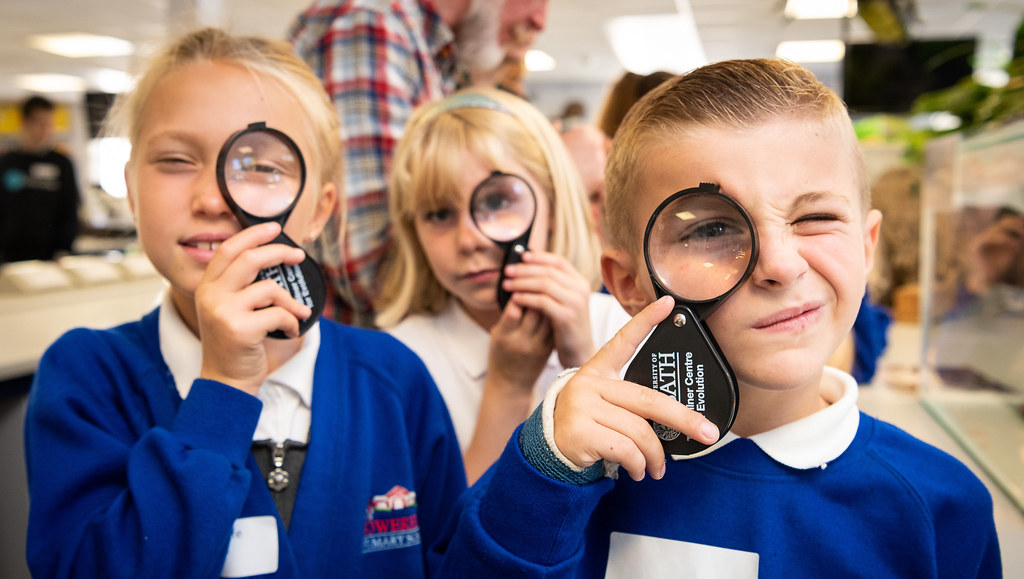Children should be taught the basics of genetics before they can fully understand evolution, according to prominent biological anthropologist, author and broadcaster Professor Alice Roberts who was at the launch of the new Milner Centre for Evolution at the University of Bath today (21 September).
To coincide with the launch, the Centre is starting a free online course aimed at teachers to help them teach evolution.
Professor Roberts, who will be presenting the 2018 Royal Institution’s Christmas Lectures on human evolution, said: “Evolution is a key concept in biology - in fact, it’s impossible to understand biology without it.
“Evolution explains how life on this planet has unfurled into all the wonderful diversity of species we see on the planet today. Genetics has joined traditional disciplines such as comparative anatomy, embryology and palaeontology to reveal more than ever about the way evolution works.
“It’s important to make sure that teaching and learning about evolution and biology is joined up - from primary, through secondary school, to university.
“But there’s a lot of debate about how best to teach the subject. There’s no guidance in the National Curriculum about whether to teach genetics or evolution first, for instance.
“So researchers at the Milner Centre for Evolution decided to tackle that question, working with schools to find the answer - and showed that teaching basic genetics first led to an improvement in children’s understanding of evolution.
I’m delighted to be involved in the new Milner Centre for Evolution, and certain that this new course will prove a great help to teachers."
The course, devised by the Milner Centre for Evolution at the University of Bath, will explain the basics of evolution and provide teachers with a suite of free resources linked to the national curriculum to support the teaching of evolution in primary and secondary schools in a fun and engaging way.
The course, Understanding and Teaching Evolution, will start on Monday 29 October and last three weeks.
All the teaching resources provided in the course are low cost, practical lesson ideas that have been tried-and-tested by 2,500 children from across the Westcountry. They include making trilobites from salt dough to understand adaptation, measuring variation of hand sizes across the class to show variation and illustrating geological timescales using toilet paper.
It follows the official launch of the Milner Centre for Evolution on 21 September, which welcomed 120 local school children to the University of Bath’s Claverton campus to explore aspects of evolution, including making frogspawn beads, learning how sharks smell, to meeting owls to learn about how these birds have adapted to their environment.
Professor Laurence Hurst, Director of the Milner Centre for Evolution and lead educator of the course said: “The Milner Centre for Evolution seeks to provide the knowledge, resources and support that teachers need, from online training and lesson plan ideas to school visits to the University.
“The Centre is uniquely based on three pillars: firstly we conduct quality evolutionary research to further our understanding of the history of life on Earth.
“However, we do not lock that knowledge away in erudite papers, we explain it through outreach, our second pillar. The public are hungry to understand evolution and we want to work with both children and adults to help answer these fundamental questions.
“Finally, our third pillar is applying evolutionary knowledge for the public good. Understanding evolution better can inform how to treat cancer more effectively, to develop better therapies, or to help tackle climate change.
“By combining pure science, applied science and outreach, we will endeavour to make discoveries and make a real difference.”
Dr Momna Hejmadi, Senior Teaching Fellow at the Milner Centre for Evolution and researcher in evolution education said: “Teachers are experienced practitioners who are able to teach a variety of complex subjects.
“However, many lack the resources and time in which to adequately plan and teach this vital topic in class.
“Our online course aims to simplify and clarify the key concepts found in most school textbooks.
“Our research at Bath asked a simple question. What is the best way to teach evolution? The answer is to teach genetics first!
“Genetics tells us how ‘random’ DNA mutations may turn out to be beneficial to an individual, and this can gradually transform populations over time, depending on natural selection.
“The best way of understanding evolution is through practical activities that engage and inspire children – a much more memorable and effective way of learning the key concepts.
“Our online resources are free for all teachers to use in their lessons, giving them accurate information and lesson plans that have been proven to work in the classroom.”

